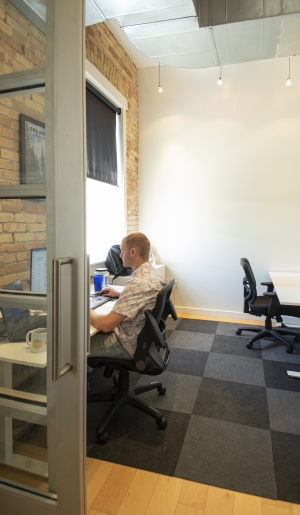5 Ways to Manage Small Business Stress
As a small business owner, what keeps you up at night? Is it the lack of sales? Not enough money? Issues with employees? Or something else?
Unfortunately, the stress will never go away, but learning how to manage it is vital to the success of your business.
In an Entrepreneur.com article, Mike Kappel, a serial entrepreneur, gives five tips on how to manage and combat your stress as a small business owner.
Remember what’s going right.
“You can improve your stress management in business by reminding yourself of the things that are going right. List out all your accomplishments and any small business milestones you’ve achieved. There are probably more than you realize. Don’t neglect even the smallest accomplishments. Put your list somewhere you can easily see it, such as on your desk or the wall. Whenever you feel stressed about all the things that are going wrong, look at your list. Take a moment to remember all the things that have gone right.”
Prioritize your goals.
“Write down everything that you need to complete. Then, rank your tasks from greatest to least. The things you need to do first should be at the top of your list. As you work, focus on the most important tasks. Once you finish those, you can move down the list. You’re essentially creating an agenda for yourself.”
Kappel discusses the anxiety that might come with seeing a long to-do list. He suggests trying to not get overwhelmed with the list and to focus on the next item on your list.
Purge your brain.
It is critical for your well-being to separate work and home, but sometimes it’s impossible. When work will not leave your mind, Kappel suggests writing everything down.
“When my brain won’t shut down, I write everything down that my mind is trying to process. I’ll write down my problem, possible solutions and miscellaneous notes. Sometimes writing everything out can take a while, but it’s worth it. After I write everything down, I can relax and sleep. My brain doesn’t have anything to process because I put all my thoughts in a safe place. I don’t have to worry about my business for a time because I know everything is waiting for me later, and I don’t have to worry about forgetting anything.”
Take breaks.
Sometimes when the stress is beginning to overwhelm you, take a break — step away from the stressor! Kappel suggests that even a ten-minute break can do wonders for you.
“When you take a break, do something that relaxes you. Go for a walk. Get some coffee. Call a friend. Watch a funny video. Don’t do anything business related. When you get back to your business, you will have a clearer mind. You will have fresh energy to tackle the task. And, stepping away might even open your eyes to a new and better way to complete the task.”
Take care of yourself.
“Good health is important when you’re an entrepreneur. Running a business takes a lot out of you. Your small business comes with long nights, early mornings, no weekends and no sick days. Your nonstop life puts strain on your body, and then you add stress on top of that.”
Kappel suggests drinking water, eating regularly, sleep, and exercise! Exercising can help release some of your anxieties and stresses, while contributing to your physical health.
Stressed? Here Are 12 Productivity Tips to Help Reduce Stress
No matter the industry or stage in your career, stress is inevitable. If you allow that stress to perpetuate, it will eventually hinder your productivity.
In a Forbes article, written by the Forbes Coaches Council, the Council created 12 tips on how to manage stress while staying productive.
Pause, Process, Proceed
Grace Totoro, a career transitions coach, states:
“Set aside time in your day to handle phone calls, texts and email. If necessary, use auto-reply and voicemail In between work on the functional aspects of your role. When stressed, apply this strategy: Pause, breathe and ask yourself, ‘What is happening now to generate these feelings?’ Process possible solutions to pull yourself together, then proceed with what needs to be done.”
Do The Hardest Things First
John M. O’Connor, the President and CEO of CareerPro, suggests leaving the smaller tasks towards the end of your day or week.
“… It helps to tackle a portion of a harder project before doing the more common work that needs to be done. When you put off a larger project like a talk, a written piece or a looming project deadline, it weighs on you and makes you less productive on the more normal, basic, but still important tasks.”
Make a List
“The best solution for being productive and alleviating stress is to make a list of things that need to be completed each day. If it is a big project, be sure to break the deliverables down into manageable pieces. It also might make sense to complete a few of the easy things early to feel more accomplished. Another solution is to keep a calendar and backfill the tasks from today until the project is actually due, filling in a timeline of when each step should be completed so that the final piece is completed on-time. Remember is always best to underpromise and overdeliver.” – Kathleen Houlihan, the Founder and CEO of Dream2Career
Turn Off Alerts
Trellish Usher of the T.R. Ellish Group, suggests:
“One of the best productivity tips I recommend and implement, which also reduces stress, is to turn off the notifications on your mobile phone for at least two hours during the workday. …”
Pick Three Essential Things
MJ Impastato, of H2H Systems, suggests reading Essentialismby Greg McKeown.
“… Pick three essential things you must get done that day and focus your energy there. You’ll soon realize your long list of to-dos get done much quicker and with more efficiency. Say goodbye to overwhelm.”
Plan Your Day Around Your Productive Times
Kyle Elliott, of Kyle Elliott Consulting, recommends:
“… Regardless of what your schedule looks like, you need to own it and plan your day to accommodate your energy levels. For the times of day when you are most productive, schedule your most important meetings and projects. Then, for your less productive times, focus on administrative tasks that need to be tended to but require less brain power.”
Spend An Hour On Each Project
“…set a timer and work on it for an hour. Turn off all distractions. Then, take a break and transition to another project. Set that same timer for 60 minutes and take another break.” – Meghan Godorov, of Meghan Godorov Consulting.
Set People Up For Success
Gordon Tredgold of Leadership Principles LLC, suggests:
“If you want people to be productive, set them up for success. People are not afraid of hard work; they are afraid of failure. If they can't see how they will succeed, productivity will go out of the window. A simple approach is to ask them if they have everything they need to be successful. Just asking this question helps. If they say yes, they have taken ownership; if they say no, give them what they need. Having everything you need to be successful is a great way of relieving stress and increasing productivity.”
Put It On Your Calendar
Jane Zaretsky, a corporate trainer and business coach, recommends:
“Your calendar should be the guiding force in your work. If you have everything, including personal time, in your calendar, you use your calendar to tell you what you should be doing and when you should be doing it, and manage that with integrity, you will not stress. …”
Give Your Employees More Autonomy
“To increase productivity and reduce stress, give employees a flexible schedule. As long as employees do their work, they should be given autonomy. People are more productive and out sick less often when they feel trusted and respected.” – Beth Kuhel, Get Hired LLC
Manage Your Internet Time
“By nature, humans are curious. And the internet is the biggest curiosity out there. I employ software on my PC that tracks the sites I go to, and then I can determine a website as distracting, productive or neutral. I then set a limit for 15 minutes maximum of distracting site access over a 9:00 a.m. to 6:00 p.m. period. … It regulates me; it's my own censor. Freeing up time that I would burn through otherwise allows me to get tasks done and reduce the overall stress and anxiety of work.” – Tyron Giuliani, Selling Made Social
Align With Your Values
“Make sure an activity you do is aligned with your top five values or priorities. If it's not, ask yourself why you are doing it. Maybe you'll still do it, but it needs to be modified to honor your values. When your activities are aligned with your values, you can feel assured that you're going to achieve your deepest desires. Then, put time on your calendar for each activity to confirm they will get done.” – Rosie Guagliardo, InnerBrilliance Coaching
Managing Small Business Stress
As a small business owner, what keeps you up at night? Is it the lack of sales? Not enough money? Issues with employees? Or something else?
Unfortunately, the stress will never go away, but learning how to manage it is vital to the success of your business.
In an Entrepreneur.com article, Mike Kappel, a serial entrepreneur, gives five tips on how to manage and combat your stress as a small business owner.
Remember what’s going right.
“You can improve your stress management in business by reminding yourself of the things that are going right. List out all your accomplishments and any small business milestones you’ve achieved. There are probably more than you realize. Don’t neglect even the smallest accomplishments. Put your list somewhere you can easily see it, such as on your desk or the wall. Whenever you feel stressed about all the things that are going wrong, look at your list. Take a moment to remember all the things that have gone right.”
Prioritize your goals.
“Write down everything that you need to complete. Then, rank your tasks from greatest to least. The things you need to do first should be at the top of your list. As you work, focus on the most important tasks. Once you finish those, you can move down the list. You’re essentially creating an agenda for yourself.”
Kappel discusses the anxiety that might come with seeing a long to-do list. He suggests trying to not get overwhelmed with the list and to focus on the next item on your list.
Purge your brain.
It is critical for your well-being to separate work and home, but sometimes it’s impossible. When work will not leave your mind, Kappel suggests writing everything down.
“When my brain won’t shut down, I write everything down that my mind is trying to process. I’ll write down my problem, possible solutions and miscellaneous notes. Sometimes writing everything out can take a while, but it’s worth it. After I write everything down, I can relax and sleep. My brain doesn’t have anything to process because I put all my thoughts in a safe place. I don’t have to worry about my business for a time because I know everything is waiting for me later, and I don’t have to worry about forgetting anything.”
Take breaks.
Sometimes when the stress is beginning to overwhelm you, take a break — step away from the stressor! Kappel suggests that even a ten-minute break can do wonders for you.
“When you take a break, do something that relaxes you. Go for a walk. Get some coffee. Call a friend. Watch a funny video. Don’t do anything business related. When you get back to your business, you will have a clearer mind. You will have fresh energy to tackle the task. And, stepping away might even open your eyes to a new and better way to complete the task.”
Take care of yourself.
“Good health is important when you’re an entrepreneur. Running a business takes a lot out of you. Your small business comes with long nights, early mornings, no weekends and no sick days. Your nonstop life puts strain on your body, and then you add stress on top of that.”
Kappel suggests drinking water, eating regularly, sleep, and exercise! Exercising can help release some of your anxieties and stresses, while contributing to your physical health.
How To Prevent Burnout? Know Thyself
Have you ever experienced burnout from work? Like, true burnout?
When you hate everything and everyone and every tiny task feels like it requires every cell in your body to wake up and do something in order for you to find a shred of motivation necessary to maintain productivity or success in your workplace?
It's more common than you think, and is often related to deadlines, pressure from bosses or colleagues, and long hours.
The problem with burnout, however, is the fact that it occurs because an individual did not speak up for their needs soon enough before they got disgruntled and began to blame other people / things instead of address the unhealthy fire raging inside of them.
For instance, if communication with your team is strained and you brush it off at the end of every day and say "It's fine, that's why it's called work", you will never actually address the issue. Instead you will suppress more and more anger with that erroneous excuse until you burn out and cannot function at work.
This scenario can be resolved much earlier by going to a supervisor and simply asking for advice.
The reason why burnout has remained a consistent event in a lot of offices is because companies are placing value on the wrong things. Certainly companies want their employees' work to get completed by whatever means necessary but, as Aytekin Tank, founder of JotForm, states:
"We’ve grown to subconsciously measure a person’s worth based off how many hours they work, how much is on their plate and put simply — whether or not they are running around like a chicken with their head cut off."
A lot of companies are getting wise to the self-care trend of offering exercise, yoga, meditation, food, drink, and nap pods in their offices to help their employees, but Tank offers the simple and cost effective intervention of advocating for yourself.
If there is a way that you know you would be more productive (working at home, from a coffee shop, in the afternoons, etc.), all you have to do is ask.
What was the last thing for which you advocated from your boss?
What should you consider advocating for right now to prevent burnout?




